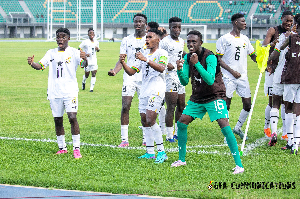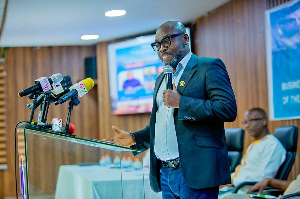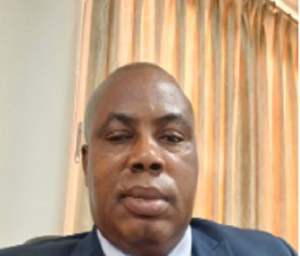- Home - News
- TWI News | TV
- Polls
- Year In Review
- News Archive
- Crime & Punishment
- Politics
- Regional
- Editorial
- Health
- Ghanaians Abroad
- Tabloid
- Africa
- Religion
- Election 2020
- Coronavirus
- News Videos | TV
- Photo Archives
- News Headlines
- Press Release
General News of Saturday, 29 November 2003
Source: GNA
Govt to spend C16 billion each on a model school
Asamankese(E/R), Nov. 29, GNA- The government is to spend 16 billion cedis for the upgrading each of the three selected model secondary schools in the Eastern Region at Oyoko, Akim Oda and New Abirem during the first phase.
The Eastern Regional Minister, Dr Francis Osafo Mensah, who announced this at the 40th anniversary celebration of the Asamankese Secondary School, (ASASCO) on Saturday, said the contract for the projects was signed at Koforidua on November 28, this year.
He assured the people that ASASCO, which was also selected as model school in the West Akim district, would be taken on board in the subsequent phase of the programme.
Dr Osafo Mensah said to ensure that basic education was accessible to all children, the government, in collaboration with donor agencies and development partners, had been spending huge sums of money to provide facilities such as classrooms blocks, furniture, libraries and staff quarters.
He, however, said since the government's resources were limited, churches, communities and private organisations should play complementary roles in providing facitilies to strengthen secondary education to cope with the rising enrolment.
Dr Osafo Mensah urged parents and guardians to give their children good education to enable them fit into the highly competitive and scientific world. He commended the school for its discipline and impressive academic records and urged the staff and students to maintain the spirit and not to do anything to tarnish the image so far attained.
The District Chief Executive for West Akim, Mr Umar Amoah, said the District Assembly was determined to support the government's efforts in upgrading facilities in schools in the district to improve teaching and learning.
He said it was in this regard that the assembly had constructed a modern laboratory block and rehabilitated an 18-unit classroom block for the school and urged the people to lend their support for more facilities in the school.
The Headmaster of the School, Mr Osafo Bedjaben Kantanka, while commending the government for the model school policy and choosing the ASASCO as one of the beneficiary schools, the mode of selecting and time for action was going to compound the "already impoverish situation of some schools such as ASASCO," which are not among the first two phases.
According to him, the Ghana Education Service (GES) would no more release funds for any rehabilitation work on any institution selected for model school if even work has not begun in such schools.
Mr Katanka, therefore, appealed to the GES to rehabilitate and sustain the school's existing facilities before they broke down completely in view of the long delay in rehabilitating them.
He mentioned the insufficient facilities facing the schools such dormitories, classroom blocks and libraries and noted that if the girl-child education campaign would succeed, then there was the need for co-educational institutions like ASASCO to be considered for the expansion of its girls dormitory. On academic achievement of the school, the headmaster announced that the school recorded 92.5 per cent passes in 2001 with a student obtaining 5 As, while in 2002, it scored 96 per cent and this year, it scored 98 per cent passes with two students, Master Abam Dennis, a business student and Miss Comfort Amo , an agriculture student, scoring 6 As and 2 each of As, Bs and Ds, respectively.
He appealed for the mechanisation of the school's borehole, rehabilitation of the roads to and within the school and the expansion of facilities.
The chief of Asamankese, Osabarima Kwaku Amoah, who chaired the function commended the government for selecting the school for Model status and appealed for it to be included in the next phase of development.
The Managing Proprietor of De Youngster International School in Accra, Mr Anthony De Youngster, announced an award of 500,000 cedis bursary to the consistently improving student in academic work for five years and 250,000 cedis each to the three best behaved students in each class for five years.










